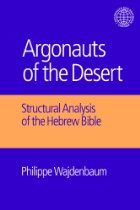 This post is a continuation of a protracted series on the views of Philippe Wajdenbaum whose doctoral thesis, arguing that a good many of the Biblical stories and laws were inspired by Greek literature, has been published as Argonauts of the Desert: Structural Analysis of the Hebrew Bible.
This post is a continuation of a protracted series on the views of Philippe Wajdenbaum whose doctoral thesis, arguing that a good many of the Biblical stories and laws were inspired by Greek literature, has been published as Argonauts of the Desert: Structural Analysis of the Hebrew Bible.
Several of the more recent posts have examined challenges to the traditional view that most of the Biblical books were composed during the late years of the Kingdom of Judah, in particular during the period of the Babylonian captivity, with a few latecomers in the Persian era. That conventional understanding has largely been based on an evolutionary model that sees the literature incorporated into the Bible being the result of a long process of oral traditions, variant traditions being mixed and matched by early editors with competing religious biases, and with later redactors putting finishing touches to certain books or the collection as a whole. Recent scholarship has seen explorations into the possibility the Bible was a very late composition, even later than the Persian empire, and even that the major historical portion of it, Genesis to 2 Kings, was composed by a single author. There have been an ever-increasing number of publications comparing that historical portion with Greek historical literature, in particular with the Histories of Herodotus and even later Hellenistic histories (e.g. Sara Mandell and David Freedman; Katherine Stott; J.W. Wesselius; Flemming Nielsen; Russell Gmirkin).

The next few posts in this series will look at the contributions of several scholars who have led this new perspective on the Old Testament literature and whom Wajdenbaum discusses in Argonauts of the Desert: Jacques Cazeaux, Philip R. Davies, Niels Peter Lemche, Thomas L. Thompson. I may add a few posts discussing other names along the way, and sometimes supplement Wajdenbaum’s descriptions based on my own readings of their works.
Unfortunately I have read nothing by Jacques Cazeaux, though the French titles of some of his books do certainly intrigue me and I’d love to follow them up. Till then, I rely on Wajdenbaum’s synopsis of his views.
